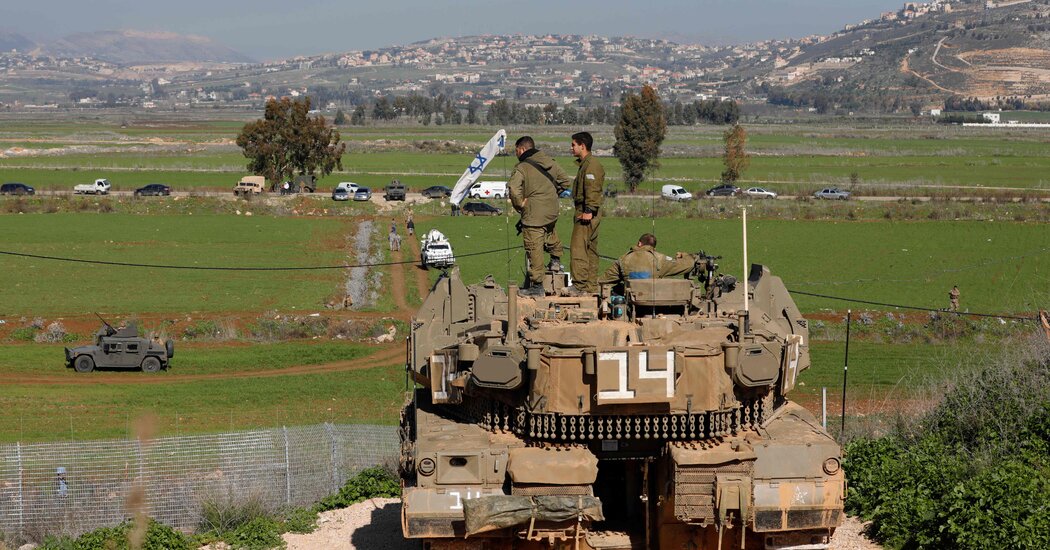Israeli security forces said on Wednesday that they had shot dead a man they accused of planting a bomb in northern Israel after he had probably infiltrated the country from southern Lebanon, in one of the most unusual security incidents along the border in years.
The military did not reveal details about the man killed but said that they were investigating whether he had been connected to Hezbollah, an Islamist militia and political movement that has long fought Israel and has a stronghold in southern Lebanon.
Israel fought a full-scale war with Hezbollah in 2006 and regularly strikes Hezbollah-linked targets in Syria, and occasionally in Lebanon, but tensions on the Israeli-Lebanese border had been kept in relative check over the past decade.
The man killed was responsible for a roadside bomb in northern Israel on Monday that seriously wounded an Israeli civilian, the Israeli military said. Some military analysts have drawn comparisons between that blast and roadside bomb attacks that targeted Israeli soldiers during Israel’s 18-year occupation of southern Lebanon from 1982 to 2000.
The military said that after planting the bomb on Monday, the man flagged down a northbound car and was later caught at a roadblock close to the border with Lebanon, outside the village of Yaara.
Officials said that security forces had shot him dead because he had been carrying a gun and an explosive belt and had posed a threat to officers at the scene. The driver is currently in detention, and the military declined to reveal his identity or nationality. Three people in Yaara told The New York Times on Wednesday that a security incident took place just outside the village on Monday.
The military did not explain how the man suspected of the bombing might have crossed the border into northern Israel. In 2018, Israel announced that it had discovered tunnels built by Hezbollah under the frontier’s fortifications. Israel also said that it had thwarted an aboveground border incursion by Hezbollah fighters in 2020.
The unusual sequence of events has compounded a growing sense of instability in Israel and the occupied territories. Within Israel, society has been deeply split by a profound dispute about the future of Israel’s democratic institutions, in particular a government plan to overhaul the judiciary that has set off mass protests and unrest in the military.
In the occupied West Bank, violence is at its deadliest level in years, and there are fears that tensions during coming religious holidays in Jerusalem might prompt a new rocket war with militias in Gaza.
The news on Wednesday raised the possibility that Lebanon-based militias might be trying to open another front on Israel’s northern border. It followed a speech last week by the leader of Hezbollah, Hassan Nasrallah, in which he cited Israel’s domestic crisis to argue that the Israeli state was collapsing. Hezbollah, a Lebanese Shia militia that controls much of southern Lebanon, is committed, like its benefactor Iran, to Israel’s destruction.
“As we have always predicted, great Israel has fallen,” Mr. Nasrallah said in a speech on Friday. “There is no trust in the army, political leaders or military leaders.”
Hezbollah and other militias in southern Lebanon have occasionally fired rockets and flown drones into Israeli territory and airspace, and Israel has sometimes fired back. But it was hoped that a landmark diplomatic deal last year between Israel and Lebanon about their shared maritime border might encourage all actors to reduce tensions further.
Instead, the events this week brought back memories of 2006, when a cross-border raid by Hezbollah led to a monthlong war that left more than 1,000 Lebanese and about 160 Israelis dead. At that time, Hezbollah ambushed an Israeli border patrol, killing three soldiers and capturing two more, leading to the outbreak of the conflict.
Israel’s decision to invade and occupy southern Lebanon in 1982 was also preceded by incursions into Israeli territory by Palestinian militias based in Lebanon, who also fired artillery shells into Israel.
In 1974, one group infiltrated the Israeli town of Maalot, about six miles south of the border, and took more than 100 Israelis hostage, eventually killing more than two dozen civilians, most of them schoolchildren.
Another Palestinian squad crossed the border in 1980, infiltrated a kibbutz and took over a nursery where toddlers and babies were sleeping, killing one toddler and an adult civilian, as well as a soldier who took part in a rescue raid.
In recent years, Lebanese herders have also been captured by Israeli forces in the border area, and interrogated on suspicion of spying for Hezbollah. But infiltration by armed groups has been much rarer.
In 2020, Israel said that it had thwarted an attempted incursion by Hezbollah gunmen in the Golan Heights, an area that Israel captured from Syria during the Arab-Israeli War of 1967.
Hwaida Saad contributed reporting from Beirut, Lebanon; and Gabby Sobelman from Rehovot, Israel.

Tinggalkan Balasan